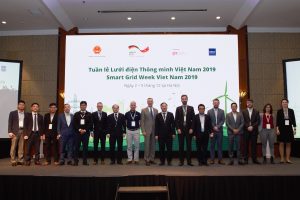
Smart Grid Week Viet Nam 2019 officially kicked off
The Smart Grid Week Viet Nam 2019 officially opened today at Melia Hotel, Hanoi with the participation of more than 100 delegates from various stakeholders.

The Smart Grid Week Viet Nam 2019 officially opened today at Melia Hotel, Hanoi with the participation of more than 100 delegates from various stakeholders.
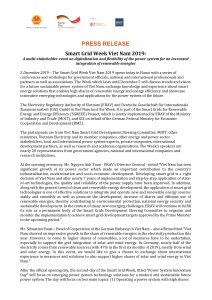
PRESS RELEASE Smart Grid Week Viet Nam 2019: A multi-stakeholder event on digitalization and flexibility of the power system for an increased integration of renewable energies 2 December 2019 – The Smart Grid Week Viet Nam 2019 opens today in Hanoi with a series of conferences and workshops for government officials, national and international professionals and partners as well as associations. The Week which lasts until December 5 will discuss trends and vision for a future sustainable power system of Viet Nam, exchange knowledge and experience about smart energy solutions that enable high shares of renewable energy and energy efficiency and showcase innovative emerging technologies and applications for the power system of the future. The Electricity Regulatory Authority of Vietnam (ERAV) and Deutsche Gesellschaft für Internationale Zusammenarbeit (GIZ) GmbH in Viet Nam host the Week. It is part of the Smart Grids for Renewable Energy and Energy Efficiency (SGREEE) Project, which is jointly implemented by ERAV of the Ministry of Industry and Trade (MOIT), and GIZ on behalf of the German Federal Ministry for Economic Cooperation and Development (BMZ). The participants are from Viet Nam Smart Grid Development Steering Committee, MOIT, other ministries, Vietnam Electricity and its member companies, other energy and power sector stakeholders, local and international power system experts, private companies, international development partners, as well as research and academia organisations. The Week’s speakers are nearly 20 representatives from government agencies, national and international companies and research institutions. At the opening ceremony, Mr. Nguyen Anh Tuan – ERAV’s Director General – noted “Viet Nam has seen significant growth of its power sector which made an important contribution to the country’s industrialization, modernization and socio-economic development. Developing smart grid is a right decision of Viet Nam and after nearly 7 years of implementation and step-by-step application of state-of-art technologies, the quality and reliability of the power supply have been improved. In addition, along with the general trend of clean and renewable energy development, the application of smart grid technologies is one of effective solutions to integrate and operate new and renewable energy sources stably and smoothly as well as promote the development, increase of shares and efficient use of renewable energies, thereby contributing to environmental protection, national energy security and sustainable development. In the context of many new emerging challenges, ERAV will continue to fulfill its role as a permanent body of the Smart Grids Development Steering Committee to organise and monitor the implementation to achieve smart grid development targets approved by the Prime Minister in the upcoming period.” Mr. Sebastian Paust – Head of Cooperation of the German Embassy in Viet Nam – also affirmed that “Viet Nam showed an impressive growth in the share of renewable energies in the electricity production this year. However, to come to higher shares of renewables, a lot of measures have to be undertaken, especially to support the grid integration of solar and wind energy. In Germany, nearly half of the electricity comes from renewable sources (with 47% in the first six months of 2019), mostly from wind and solar energy. In this event, we would like to give a chance to exchange about international experience in measures and solutions to also support higher shares of solar and wind energy in Viet Nam.” After the official opening day, the second-day of the Smart Grid Week, titled “Power System Innovation Day” will focus on emerging power system technology solutions for a modern and sustainable future power system. The day will focus on two main topics: (1) Operating a power system with high shares of renewable energy and (2) Smart Energy Solutions: Innovations and concepts for the Energy System of the Future. On December 4, different seminars will be organised for knowledge exchange between power system experts and academia. The “Smart Grid Symposium Vietnam” day will have in-depth discussions and collect valuable inputs from experts on the topics of (1) Flexibility options for high shares of RE; (2) The impact of Renewable Energy on the power system and (3) Enabling a Smart Grid with regulative frameworks. Named “Future Lab: Internet of Energy”, the last day will open discussion forums about vision for the power system of the future. The participants will jointly identify the challenges of the Vietnamese energy system in the future and discuss how these hurdles can be overcome by the presented solutions of information and communication technologies (ICT). In his closing remarks, Mr. Tobias Cossen – GIZ’s Project Director – said, “In order to position the topic of Smart Grids within the attention of all relevant stakeholders, including high level government actors, it is important to have Smart Grid specific events and an exchange platform. This is the reason why ERAV and GIZ decided to implement the Smart Grid Week, to have a broad programme with many inputs both from international and national experts on different aspects of Smart Grids. This is the first time, that there will be a Smart Grid specific event in Viet Nam. The Smart Grid Week will connect all relevant stakeholder from the public and private sector and push the topic further on the political agenda.” As one of the most dynamically growing economies in Asia, Viet Nam faces an enormous increase in energy demand that will continue to grow at a double-digit rate in the coming years. Although there are constant investments in generation and grid infrastructure, reliability and security of electricity supply remain substantial challenges for the Vietnamese power system, especially in the period of 2021-2025, which may cause supply-demand risks. Recognizing the great benefit in upgrading the national power transmission system, the Government of Viet Nam signed Decision No. 1670 / QD-TTg on November 8, 2012, approving a strategy on developing Smart Grid in Viet Nam (in short: Smart Grid Road Map). The Road Map aims to improve the quality and reliability of the national power supply and to improve the efficient use of electricity. To support the Road Map, ERAV and GIZ have implemented the SGREEE project since 2017. Under
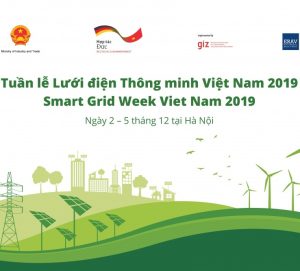
The Smart Grid Week Viet Nam 2019 will take place in Hanoi from December 2-5 with a series of conferences and workshops for government officials as well as national and international professionals and partners.
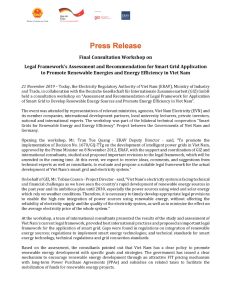
Press Release Final Consultation Workshop on Legal Framework’s Assessment and Recommendation for Smart Grid Application to Promote Renewable Energies and Energy Efficiency in Viet Nam 21 November 2019 – Today, the Electricity Regulatory Authority of Viet Nam (ERAV), Ministry of Industry and Trade, in collaboration with the Deutsche Gesellschaft für Internationale Zusammenarbeit (GIZ) GmbH held a consultation workshop on “Assessment and Recommendation of Legal Framework for Application of Smart Grid to Develop Renewable Energy Sources and Promote Energy Efficiency in Viet Nam”. The event was attended by representatives of relevant ministries, agencies, Viet Nam Electricity (EVN) and its member companies, international development partners, local university lecturers, private investors, national and international experts. The workshop was part of the bilateral technical cooperation “Smart Grids for Renewable Energy and Energy Efficiency” Project between the Governments of Viet Nam and Germany. Opening the workshop, Mr. Tran Tue Quang – ERAV Deputy Director – said, “To promote the implementation of Decision No. 1670/GQ-TTg on the development of intelligent power grids in Viet Nam, approved by the Prime Minister on 8 November 2012, ERAV, with the support and coordination of GIZ and international consultants, studied and proposed important revisions to the legal framework, which will be amended in the coming time. At this event, we expect to receive ideas, comments, and suggestions from technical experts as well as consultants, to evaluate and propose a suitable legal framework for the actual development of Viet Nam’s smart grid and electricity system.” On behalf of GIZ, Mr. Tobias Cossen – Project Director – said, “Viet Nam’s electricity system is facing technical and financial challenges as we have seen the country’s rapid development of renewable energy sources in the past year and its ambitious plan until 2030, especially the power sources using wind and solar energy which rely on weather conditions. Therefore, it is necessary to timely develop appropriate legal provisions to enable the high-rate integration of power sources using renewable energy, without affecting the reliability of electricity supply and the quality of the electricity system, as well as to minimize the effect on the average electricity price of the whole system.” At the workshop, a team of international consultants presented the results of the study and assessment of Viet Nam’s current legal framework, provided best international practices and proposed an important legal framework for the application of smart grid. Gaps were found in regulations on integration of renewable energy sources; regulations to implement smart energy technologies; and technical standards for smart energy technology, technical regulations and grid connection standards. Based on the assessment, the consultants pointed out that Viet Nam has a clear policy to promote renewable energy development with specific goals and strategies. The government has issued a clear mechanism to encourage renewable energy development through an attractive FIT pricing mechanism with long-term Power Purchase Agreements (PPAs) and subsidies on related taxes to facilitate the mobilization of funds for renewable energy projects. However, a policy of promoting renewable energy on the part of electricity users has not been given due attention. PPAs, which are currently limited to signing with only one buyer-EVN, and Direct Power Purchase Agreements (DPPAs), which allow power plants to sell renewable-based generated electricity directly to large power consumers, are just at the planning stage of pilot implementation. Also, the approval of a large proportion of renewable energy sources mainly focuses on certain territories and is not synchronized with the current situation and progress of investment in electricity transmission grids while the existing FIT pricing mechanism does not reflect the market price signal. The consultants made some key recommendations, including attractive financial mechanisms to attract renewable energy power plants to participate in the energy balance and ancillary service market; specific regulations and mechanisms to control grid congestion, limiting curtailment of renewable energy sources in line with the trend of integrating high proportion of renewable energy; as well as regulations and mechanisms to encourage the installation of an energy storage system and to allow the participation of auxiliary service providers to increase the flexibility and reliability of the electricity system. Other suggestions are appropriate financial mechanisms to implement the Demand Response Programme (DR) and attractive financial regulations and mechanisms to enable the realization of the virtual power plant (VPP) model. Following the presentations was an open discussion among the delegates to gather feedback on assessments and recommendations on the legal framework for the smart grid application in Viet Nam. The consultants will then make the final recommendations which are most suitable for the application in the country.
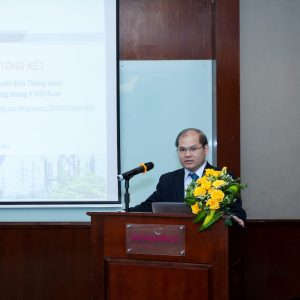
Final consultation workshop on assessment and recommendations for smart grid application held in Hanoi.
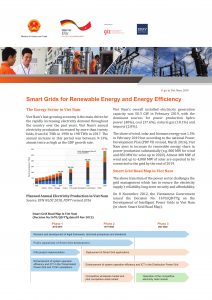
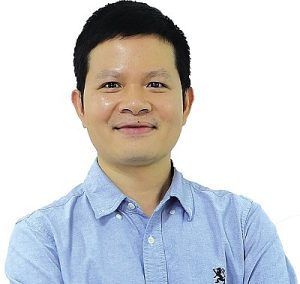
Vietnam is serious about the future growth of its energy sector, which will be spurred by solar energy, thermal power generation, and wind energy.
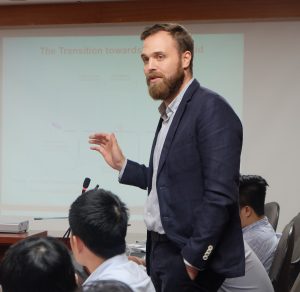
The annual meeting of Steering Committee on Smart Grid Development took place in Hanoi on April 4, 2019 to review last year’s activities in the implementation of the Smart Grid Road Map and decide plans for 2019. Mr. Nguyen Anh Tuan – Director General of the Electricity Regulatory Authority of Viet Nam (ERAV) – chaired the event on behalf of the Ministry of Industry and Trade. Participants were representatives from Ministries of Planning and Investment, Finance, Science and Technology, Construction, the Electricity of Vietnam and other relevant agencies. Representatives of the Deutsche Gesellschaft für Internationale Zusammenarbeit (GIZ) GmbH also participated in the event, presenting an overview of its Smart Grids for Renewable Energy and Energy Efficiency (SGREEE) project and introducing feasible smart grid technologies and solutions for the integration of renewable energy sources into the power system of Viet Nam. By February 2019, Viet Nam’s overall installed electricity generation capacity was 50.3 GW, with the dominant sources for power production hydro power (40%), coal (37.6%), natural gas (18.1%) and imports (2.8%). The country aims to increase its renewable energy share in power production substantially (e.g. 800 MW for wind and 850 MW for solar up to 2020), according to the national Power Development Plan (PDP VII revised, March 2016). Due to successful incentive mechanisms for the development of wind and solar energy resources, 400 MW of wind and up to 2,000 MW of solar are expected to be connected to the grid by the end of 2019 and the figures will increase more afterwards. However, this transition of the power sector is a challenge to the grid management which has to ensure the electricity supply’s reliability, long-term security and affordability. With substantial foresight, the Government of Viet Nam already issued Decision No. 1670/QD-TTg on the Development of Intelligent Power Grids in Viet Nam (in short: Smart Grid Road Map) on 8 November 2012. The Road Map aims to increase the quality and reliability of power supply as well as to improve the effective use of electricity. Established in 2013, the Steering Committee has responsibilities to instruct relevant agencies to develop smart grid projects, identify the projects’ specific targets, assign tasks to implementing agencies and supervise the implementation of Decision No. 1670/QD-TTg. The Ministry of Industry and Trade chairs the committee and ERAV is its standing agency. The SGREEE project is supporting the Vietnamese government in the implementation of its Smart Grid Road Map. Funded by the German Federal Ministry for Economic Cooperation and Development (BMZ), the project now works closely with ERAV to support experts of the Vietnamese power sector in developing a Smart Grid, which allows the integration of an increasing share of renewable energies and supports greater energy efficiency. The project, carried out from 2017 till 2021, consists of three main Actions Areas: Legal and Regulatory Framework, Capacity Development and Technology Cooperation Smart Grid is a two-way interchange where both electricity and information can be exchanged in both directions between the power utilities and the consumers. It uses digital technology to improve reliability, security and efficiency of the power system and allows for especially volatile renewable energy, such as wind and solar power production to be integrated in a large scale into the national grid. In contrast, the current grid uses a limited one-way interaction, in which power flows from the power plant to the consumer.